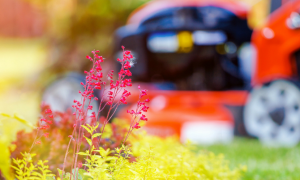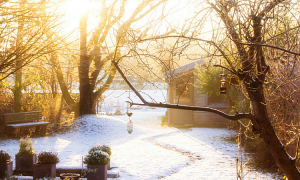Guest post by Linda Lee Ruzicka
There is more to fertilizing a lawn than just going outside and sprinkling fertilizer around. There are do’s and don’ts and guidelines to make sure that your yard is getting what it needs to grow. Read on to learn how to fertilize your lawn in Jacksonville.
Timing Your Fertilization
The weather for Jacksonville, Florida, is a combination of long hot summers and short cool winters. It’s also wet year round, and the temperatures range from 32°F in the winter to above 95°F in the summer. Learn how to fertilize your lawn correctly in this type weather. When winter hits and the lawn turns a muddy brown, you might be tempted to add fertilizer; don’t though.
Fertilizer is applied during the growing season, which is spring and summer. If you put fertilizer on a lawn in the winter, you could kill it. Because your lawn isn’t irrigated in the winter, and salt can have a buildup under the surface, adding fertilizer to it can be a recipe for disaster. When it’s applied during the growing season, the grass will have healthier roots, which will grow deeper to better weather the hot months.
What’s in Fertilizer?
Fertilizer is the term used to describe the group of elements needed to help the plants such as grass to grow. The elements nitrogen, potassium, and phosphorus are the main ingredients in fertilizer, along with some other trace elements. These trace elements are needed for healthy root development and proper growth of plant life.
Although many of these nutrients are in normal soil, the fast-growing grass uses them up very quickly. Depletion of these nutrients shows up as an increase in weeds, infestation of insects, poor color, and even plant diseases. When the grass is fed, depending on what kind of grass it is and the type of soil, then it becomes healthy again, which is why fertilizer is added. Plus, if your soil has a pH over 6.5, buying a fertilizer that has manganese and iron in it gives better results.
Other Fertilizing Tips
Here are some application and fertilizer feeding tips when working on your lawn:
- Don’t apply fertilizer to your yard before a heavy rain or during a flood watch or warning. This also means not to apply it during a tropical storm watch or before a hurricane. Wait until the weather calms down before using fertilizer.
- Don’t apply the fertilizer to grass that’s wet. But do water the fertilizer with about a ¼ inch of water after applying it so nitrogen isn’t lost.
- If you’re using a cyclone/rotary spreader, don’t be within 10 feet of a body of water. If you’re using a cyclone/rotary spreader with a deflector shield or a drop spreader, stay back 3 feet from wetland areas or bodies of water. This is so that it doesn’t pollute the water source.
- When applying, keep the fertilizer off hard surfaces such as driveways, roads, or sidewalks. If it does get spilled accidentally on a hard surface, then sweep or blow it into a plant bed or lawn; or put it into the bag it came in.
Consider Hiring a Professional
In an effort to protect the watershed, Florida has implemented some of the strictest laws in the nation concerning fertilization. In fact, it’s quite difficult for professionals to obtain a fertilization license.
Applying fertilizer incorrectly can not only damage the water supply and the environment, but it can kill your lawn. Many homeowners end up with fertilizer burn because they apply chemicals improperly. Additionally, professionals have access to higher quality, less damaging chemicals than what you can buy at the hardware store. Fortunately, there are a number of quality lawn services in Jacksonville with years of experience applying various chemicals. Most offer some sort of guarantee, and many also offer organic options. For the cost of $200–300 per year, it may be worth offloading fertilization to the professionals and save your lawn and the environment while you’re at it.
Linda Lee Ruzicka is an avid gardening and landscaping blogger and expert. In her spare time she can be found enjoying and relaxing in several gardens around her home that she tends.
[cf]skyword_tracking_tag[/cf]






